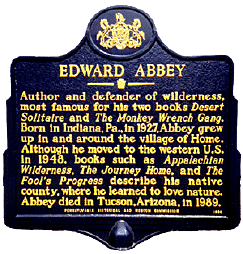State Historical Marker in Home, PA
 The Pennsylvania Historical and Museum Commission
approved Jim Cahalan's proposal for a state
historical marker commemorating Edward Abbey in Home,
Pennsylvania, nearby where Ed grew up. They turn down more such
proposals than they approve, but several strong letters of
support (including one from Robert Redford, and another by Kirk
Douglas from the LA TIMES in 1989) helped win their approval.
The Pennsylvania Historical and Museum Commission
approved Jim Cahalan's proposal for a state
historical marker commemorating Edward Abbey in Home,
Pennsylvania, nearby where Ed grew up. They turn down more such
proposals than they approve, but several strong letters of
support (including one from Robert Redford, and another by Kirk
Douglas from the LA TIMES in 1989) helped win their approval.
The cost of the sign, $1,250, was raised privately and the marker was dedicated on Saturday September 28th 1996, with about 100 people attending the sign's unveiling followed by a luncheon and program at the nearby Rocky Glen Inn. The program of speakers included Nancy Abbey, Ed's sister, who flew in from Santa Cruz, California for the event. Ed's two other surviving siblings, Howard and Bill, were also on hand, as were Iva Abbey (Howard's wife) and quite a few other Abbey relatives and friends. Despite a torrential downpour (the kind of too typical Western Pennsylvania weather that drove Ed Abbey to the sunny West), all came off in good order, and everyone seemed to have a great time.
For anyone heading that way who may want to see the marker, it's adjacent to the Home village marker on Route 119 about 10 miles north of the larger town of Indiana (which is 55 miles northeast of Pittsburgh).
Above you can see what the marker looks like. The text on the sign reads:
| EDWARD ABBEY Author
and defender of wilderness, PENNSYLVANIA HISTORICAL AND MUSEUM COMMISSION 1996 |
Thanks to all of you who helped raising the funds for this marker, with special thanks to Dan Spomer and Eric Temple whose contributions were especially generous, and many thanks to Jim Cahalan for putting a lot of work and heart into this project!
Replica now available
A replica of the state historical marker, in the form of a magnet suitable for the front of your refrigerator, is now available for $2 apiece including first-class mailing from Back of Beyond Books in Moab, Utah, the best source for reasonably priced Abbey books, videos, and memorabilia. Call Josť Knighton (a published poet and friend of Ed) there at 1-800-700-2859. You can read more about these magnets at the manufacturers site.
Now to those of you who recall Henry Lightcap blowing up his refrigerator at the beginning of The Fool's Progress, let me remind you that Ed himself sang the praises of the refrigerator in Desert Solitaire:
"The refrigerator...is a useful machine....It is in fact one of the few positive contributions of scientific technology to civilization and I am grateful for it....Every time I drop a couple of ice cubes into a glass I think with favor of all the iron and coal miners, bargemen, railroaders, steelworkers, technicians, designers, factory assemblers, wholesalers, truckdrivers, and retailers who have combined their labors (often quite taxing) to provide me with this simple but pleasant convenience, without which the highball or the Cuba libre would be poor things indeed."
So I think Ed would feel at home on the front of your refrigerator. If you can't come see the historical marker, then bring it to your own kitchen. Enjoy!
Letter from Robert Redford
- January 3, 1996
To the members of the Pennsylvania Historical Marker Commission:
I am writing to voice my support for the proposed State Historical Marker for Edward Abbey in Home, where he grew up and discovered his love for nature. I have been an admirer of Abbey's work for many years, and had the pleasure of knowing him.
Since the 1950's, Edward Abbey has been recognized as an accomplished novelist and essayist as well as a key voice in the struggle to defend wilderness from the continual onslaught of "progress". Through his work, he has positively influenced many to not only treasure our natural heritage but to fight for its preservation as well.
After spending his childhood in Indiana County, Abbey lived in many different places in the West and he was laid to rest at an unknown site somewhere in the desert. He certainly deserves commemoration in the form of a historical marker in the area where he grew up and often wrote about in such works as Jonathan Troy and The Fool's Progress. I hope that you will give the proposal the benefit of your full consideration, and I will look forward to learning the outcome.
Sincerely,
Robert Redford
This letter was supplied by Jim Cahalan, Professor of English at Indiana University of Pennsylvania and appears here with Mr. Redford's permission.
Why ads for Amazon?